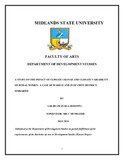Please use this identifier to cite or link to this item:
https://cris.library.msu.ac.zw//handle/11408/721| Title: | A study on the impact of climate change and climate variability on rural women: a case of ward 22 and 28 of Chivi district, Zimbabwe | Authors: | Chanaka, Sarah | Keywords: | Climate change Rural women |
Issue Date: | 2014 | Publisher: | Midlands State University | Abstract: | The thrust of this study was to investigate the impact of climate change and climate variability on rural women. It identifies the reasons why women are more vulnerable to climate change as compared to men and adaptation strategies implemented by women to adapt to the vagaries of climate change. The researcher selected women in ward 22 and 28 using random sampling. During the study, a structured questionnaire consisting of both closed and open-ended questions will be administered to the selected households. Interviews were conducted and each woman from a selected household will be asked the same series of questions and responses are organized so that conclusions can be drawn. Personal observations were also used to see the environment from which the women derive their livelihoods. The research findings show that women are at the frontline of climate change impacts due to the existing gender disparities. These include lack of access to and control of resources, lack of freedom of actions, reproductive role burden, and lack of access to technology as a result of their illiterate as well as lack of participation in decision-makings in climate change interventions. The research findings also depicts that climate change undermines development efforts due to food insecurity resulted from drought and it also widen the gap between the poor and the rich. Therefore, the study recommends economic empowerment of women since the effects of climate change on women are not gender neutral and also to carry out gender analysis in all climate policies, programs, budgets and projects. This helps to address the differing ways in which climate change affects men and women thereby creating gender-sensitive policies. The government should chip in and help to build and strengthen women’s experiences, knowledge and coping capacities in adaptation policies and ensuring that women’s needs and interests are incorporated in livelihood adaptation strategies. | URI: | http://hdl.handle.net/11408/721 |
| Appears in Collections: | Bachelor Of Arts In Development Studies Honours Degree |
Files in This Item:
| File | Description | Size | Format | |
|---|---|---|---|---|
| Dissertation Final draft-Chanaka.pdf | 660.35 kB | Adobe PDF |  View/Open |
Page view(s)
168
checked on Apr 19, 2025
Download(s)
1,130
checked on Apr 19, 2025
Google ScholarTM
Check
Items in MSUIR are protected by copyright, with all rights reserved, unless otherwise indicated.



